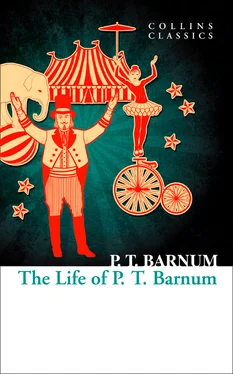About the last prosecution which we had in Danbury for a violation of the Sabbath, was in the summer of 1825. There was a drought that season. The grass was withered, the ground was parched, all vegetation was seriously injured, and the streams far and near were partially or wholly dried up. As there were no steam mills in those days, at least in that vicinity, our people found it difficult to get sufficient grain ground for domestic purposes without sending great distances. Our local mills were crammed with the “grists” of all the neighborhood awaiting their turn to be converted into flour or meal. Finally it commenced raining on a Saturday night, and continued all day Sunday. Of course, everybody was delighted. Families who were almost placed upon an “allowance” of bread, were gratified in the belief that the mills would now be set a-going, and that the time of deliverance was at hand. One of our millers, an eccentric individual, and withal a worthy man, knowing the strait in which the community was placed, and remembering that our Saviour permitted his disciples to pluck ears of corn upon the Sabbath, concluded to risk the ire of bigoted sticklers who strained at a gnat and swallowed a camel, set his mill in motion on Sunday morning, and had finished many a grist for his neighbors before Monday’s sun had arisen.
On Monday afternoon he was arrested on a grand juror’s complaint for breaking the Sabbath. He declined employing counsel, and declared himself ready for trial. The court-room was crowded with sympathizing neighbors. The complaint was read, setting forth the enormity of his crime in converting grain into flour on the holy Sabbath – but it did not state the fact, that said grinding saved the whole neighborhood from a state of semi-starvation. The defendant maintained a countenance of extreme gravity.
“Are you guilty or not guilty?” asked the man of judicial authority.
“Not guilty – but I ground,” was the reply.
Loud laughter, which the court declared was quite unbecoming the halls of justice, was here indulged by the spectators.
As the act was confessed, no evidence was adduced on the part of the State. Numerous witnesses testified regarding the great drouth, the difficulty in procuring bread from the lack of water to propel the mills, and stated the great necessity of the case. The defendant said not a word, but a verdict of not guilty was soon returned. The community generally was delighted, and the ideas that had heretofore existed in that vicinity, that a cat should be punished for catching a mouse on Sunday, or that a barrel of cider should be whipped for “working” on the first day of the week, became obsolete; compelling men to go to “meeting” went out of fashion; in fact, a healthy reaction took place, and from that time the inhabitants of Connecticut became a voluntary Sabbath-observing people, abstaining from servile labor and vain recreation on that day, but not deeming it a sin to lift a suffering ox from the pit if he happened to be cast therein after sunset on Saturday, or before sundown on Sunday.
My father, besides being in the mercantile line, and keeping the village tavern, ran a freight wagon to. Norwalk, and kept a small livery stable. On one occasion, a young man named Nelson Beers applied to him for the use of a horse to ride to Danbury, a distance of three miles. Nelson was an apprentice to the shoe-making business, nearly out of his time, was not over-stocked with brains, and lived a mile and a half east of our village. My father thought that it would be better for Nelson to make his short journey on foot than to be at the expense of hiring a horse, but he did not tell him so.
We had an old horse named “Bob.” Having reached an age beyond his teens, he was turned out in a bog lot near our house to die. He was literally a “living skeleton” – much in the same condition of the Yankee’s nag, which was so weak his owner had to hire his neighbor’s horse to help him draw his last breath. My father, in reply to Nelson’s application, told him that the livery horses were all out, and he had none at home except a famous “race-horse,” which he was keeping in low flesh in order to have him in proper trim to win a great race soon to come off.
“Oh, do let me have him, Uncle Phile; fn1I will ride him very carefully, and not injure him in the least; besides, I will have him rubbed down and fed in Danbury,” said Nelson Beers.
“He is too valuable an animal to risk in the hands of a young man like you,” responded my father.
Nelson continued to importune, and my father to play off, until it was finally agreed that the horse could be had on the condition that he should in no case be ridden faster than a walk or slow trot, and that he should be fed four quarts of oats at Danbury.
Nelson started on his Rosinante, looking for all the world as if he was on a mission to the “carrion crows;” but he felt every inch a man, for he fancied himself astride of the greatest race-horse in the country, and realized that a heavy responsibility was resting on his shoulders, for the last words of my father to him were, “Now, Nelson, if any accident should happen to this animal while under your charge, you could not pay the damage in a lifetime of labor.”
Old “Bob” was duly oated and watered at Danbury, and at the end of several hours Mr. Beers mounted him and started for Bethel. He concluded to take the “great pasture” road home, that being the name of a new road cut through swamps and meadows, as a shorter route to our village. Nelson, for the nonce forgetting his responsibility, probably tried the speed of his race-horse and soon broke him down. At all events something occurred to weaken old Bob’s nerves, for he came to a stand-still, and Nelson was forced to dismount. The horse trembled with weakness, and Nelson Beers trembled with fright. A small brook was running through the bogs at the roadside, and Beers thinking that perhaps his “racehorse” needed a drink, led him into the stream. Poor old “Bob” stuck fast in the mud, and not having strength to withdraw his feet, quietly closed his eyes, and, like a patriarch as he was, he dropped into the soft bed that was awaiting him, and died without a single kick.
No language can describe the consternation of poor Beers. He could not believe his eyes, and vainly tried to open those of his horse. He placed his ear at the mouth of poor old Bob, but took it away again in utter dismay. The breath had ceased.
At last Nelson, groaning as he thought of meeting my father, and wondering whether eternity added to time would be long enough for him to earn the value of the horse, took the bridle from the “dead-head,” and unbuckling the girth, drew off the saddle, placed it on his own back, and trudged gloomily towards our village.
It was about sundown when my father espied his victim coming up the street with the saddle and bridle thrown across his shoulders, his face wearing a look of the most complete despair. My father was certain that old Bob had departed this life, and he chuckled inwardly and quietly, but instantly assumed a most serious countenance. Poor Beers approached more slowly and mournfully than if he was following a dear friend to the grave.
When he came within hailing distance my father called out, “Why, Beers, is it possible you have been so careless as to let that race-horse run away from you?”
“Oh, worse than that – worse than that, Uncle Phile,” groaned Nelson.
“Worse than that! then he has been stolen by some judge of valuable horses. Oh, what a fool I was to intrust him to anybody!” exclaimed my father with well-feigned sorrow.
“No, he ain’t stolen, Uncle Phile,” said Nelson.
“Not stolen! well, I am glad of that, for I shall recover him again; but where is he? I am afraid you have lamed him.”
Читать дальше












